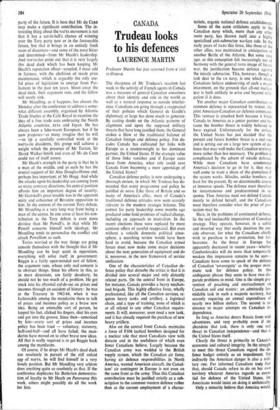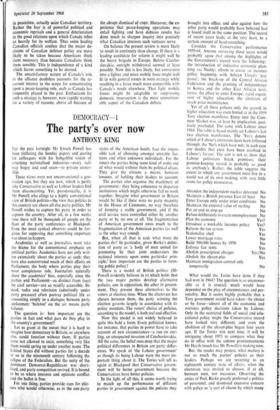Trudeau looks to his defences
CANADA LAURENCE MARTIN
Professor Martin has just returned from a visit to Ottawa.
The sharpness of Mr Trudeau's reaction last week to the activity of French agents in Canada was a measure of general Canadian uneasiness about their identity and role in the world as well as a natural response to outside interfer- ence. Canadians are going through a reappraisal of their policies which General de Gaulle's diplomacy at large has done much to generate. By casting doubt on the Atlantic patterns of alignment and upon the supposed military threats that have long justified them, the General strikes a blow at the traditional balance of Canadian foreign and defence policy. For de- cades Canada has cultivated her links with Europe as a counterweight to her dominant partner, the United States. If the strategic value of those links vanishes and if Europe casts loose from America, what role could save Canada from becoming a mere appendage of the United States?
Canadian defence policy is now undergoing a thorough review, in which Mr Trudeau has de- manded that every programme and policy be justified de novo. Like those of Britain and so many of America's allies, most of Canada's traditional defence attitudes now seem scarcely relevant to the modern strategic balance. The contest for party leadership some months ago produced some bold promises of radical change, including an approach to neutralism. In the recent elections these were replaced by more cautious offers of careful reappraisal. But even without a volatile domestic political atmo- sphere, a searching review would have been hard to avoid, because the Canadian armed forces must now make some major decisions about the next generation of equipment and do it, moreover, in the new framework of service unification.
One of the characteristics of Canadian de- fence policy that disturbs the critics is that it is divided into several major and only distantly related parts. On the central front in Europe, for instance, Canada provides a heavy mechan- ised brigade. This highly effective force, wholly professional, like all the Canadian services, re- quires heavy tanks and artillery, a logistical chain, and a type of training, none of which is at all related to any other Canadian require- ments. It will, moreover, soon need a new tank, and it has already required the purchase of new heavy artillery.
Also on the central front Canada maintains a force of F104 tactical bombers designed for a nuclear role that most Canadians view with distaste and in the usefulness of which even fewer Canadians believe. Largely because the Canadian army was wedded to the British supply system, which the Canadian air force, having air defence responsibilities in North America, wanted American aircraft, the Canad- ians' air contingent in Europe is not even on the same front as the army. Thus this Canadian contribution must be justified strictly as a sub- scription to the common western defence rather than as the current employment of a charac-
teristic, organic national defence establishment. Some of the same criticisms apply to the Canadian navy which, more than any other NATO navy, has thrown itself into a highly specialised anti-submarine warfare role. In the early years of NATO this force, like those of the other allies, was maintained in anticipation of another Battle of the Atlantic. But some time ago, as this conception felt increasingly out of harmony with the general NATO image of future war, the justification became defence against the missile submarine. This, however, though a task dear to the us navy, is one which many Canadians believe undeserving of such a major investment, on the grounds that all-out nuclear war is both unlikely to arise and beyond miti- gation if it does.
Yet another major Canadian contribution to common defence is represented by NORAD, the joint American-Canadian air defence command. This venture is attacked both because it binds Canada to America as a junior partner and be- cause the bomber threat is widely believed to have expired. Unfortunately for the critics, the United States has just decided that the present and future bomber threat is a real one and is setting out on a large new system of de- fence that may well make the Canadian territory more rather than less necessary. The problem is complicated by the advent of missile defence. While most Canadians have condemned America's decision to go in for it, they may well come to want a share of the protection if the system works. Missiles, unlike bombers, at least for the present, fly on determinable course at immense speeds. The defence must therefore be instantaneous and predetermined in re- sponse. Thus America need not defend Canada merely to defend herself, and the Canadians must therefore consider what the price of pro- tection may be.
Here, in the problems of continental defence, lie the real ineducable imperatives of Canadian strategy. They operate, however, in a subtle and inverted way that easily deceives the out- side observer, for what the Canadians chiefly wish to purchase is not protection, but for- bearance. As the threat in Europe has apparently decreased in recent years—whether Czechoslovakia will do more than temporarily weaken this impression remains to be seen— Canadians have come to speak of the defence of Canadian 'sovereignty' as the proper mini- mum task for defence policy. In this ambiguous phrase they seem to have two dis- parate problems in mind. One is the simple pre- Vbntion of poaching and encroachment on Canadian soil and waters: an admittedly for- midable task in such a majestic territory, but scarcely requiring an annual expenditure of nearly two billion dollars. The second is re- sistance to major attempts on Canadian in- dependence.
So long as America deters Russia from wild adventures, and very probably even if she
abandons that task, there is only one real threat to Canadian independence—and that is the United States itself.
Clearly the threat is primarily to Canada's economic and cultural integrity. In the struggle to meet this threat Canadians regard the de- fence budget entirely as an impediment. Yet indirectly the American danger is also a mili- tary one. For informed Canadians truly fear that, should Canada refuse to do on her own territory whatever America regards as essen- tial for defence of the United States, the Americans would insist on doing it unilaterally. Only a minority believe that America would,
in peacetime, actually seize Canadian territory. Rather the fear is of powerful political and economic reprisals and a general deterioration in the good relations upon which Canada relies so heavily for its welfare. Thus some leading Canadian officials confess that the major de- cisions of Canadian, defence policy are more likely to be taken because Americans think them necessary than because Canadians think them sensible. This is independence of a kind which leaves something to be desired.
The unsatisfactory nature of Canada's role in the alliance doubtless accounts for the re- current interest in the scope for concentrating upon a peace-keeping role, such as Canada has frequently played in the past. Enthtisiasm for such a strategy is, however, now rapidly waning for a variety of reasons, above all because of
the abrupt dismissal of tn. Moreover, the ex- perience that peace-keeping operations may entail fighting and have dubious results has done much to sharpen inquiry into precisely what Canadian interests such ventures serve.
On balance the present review is more likely to result in continuity than change. If there is a leading candidate for reform it might well be the heavy brigade in Europe. Before Czecho- slovakia, outright withdrawal seemed at least possible. Now this is less likely, but conversion into a lighter and more mobile force might well fit in with general trends in NATO strategy while resulting in a force much more compatible with Canada's needs elsewhere. That light mobile forces might be adaptable to suppressing domestic insurrection is the most unmention- able aspect of the Canadian debate.











































 Previous page
Previous page